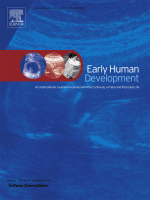Early Human Development
Early Human Development is a comprehensive field that encompasses the biological, psychological, and emotional changes that occur in human beings between conception and the end of adolescence, as the individual progresses from dependency to increasing autonomy. This article focuses on the biological aspects of development, which begin with fertilization and end with the transition into adulthood.
Fertilization and Embryonic Development[edit | edit source]
The process of early human development begins with fertilization, where a sperm cell from a male merges with an ovum (egg cell) from a female to form a zygote. This marks the beginning of the embryonic stage. The zygote undergoes multiple cell divisions, a process known as cleavage, and becomes a blastocyst, which then implants itself into the wall of the uterus.
Following implantation, the blastocyst develops into an embryo. During this embryonic stage, the foundations for all major organ systems are established. This period is critical and sensitive to environmental influences, which can potentially cause congenital birth defects. The embryonic stage is characterized by the formation of the placenta, which will provide nourishment and remove waste for the developing fetus throughout pregnancy.
Fetal Development[edit | edit source]
After the first eight weeks, the embryo is referred to as a fetus. This fetal stage is marked by rapid growth and further development of the organ systems established during the embryonic stage. The brain develops significantly during this period, and by the end of the first trimester, the fetus can move and respond to external stimuli.
During the second trimester, the fetus continues to grow in size and weight. The lungs begin to produce surfactant, a substance crucial for breathing outside the womb. The senses of the fetus, such as hearing, start to develop, and it may begin to show signs of consciousness.
The third trimester is characterized by the full development of the fetal organ systems to prepare for life outside the womb. The fetus gains weight rapidly, and the brain continues to develop. By the end of this trimester, the fetus is usually considered viable outside of the uterus, with a good chance of survival if born prematurely.
Birth and Neonatal Period[edit | edit source]
The culmination of early human development is birth, which occurs typically after 40 weeks of pregnancy. Birth marks the end of the fetal stage and the beginning of the neonatal period. The neonatal period, the first four weeks of life outside the womb, is a critical time of adaptation for the newborn as it adjusts to breathing air and digesting food independently.
Conclusion[edit | edit source]
Early human development is a complex and dynamic process that sets the foundation for an individual's health, growth, and psychological development throughout life. Understanding the stages of development from fertilization to birth is crucial for healthcare professionals, parents, and educators to ensure the well-being and healthy growth of children.
Search WikiMD
Ad.Tired of being Overweight? Try W8MD's physician weight loss program.
Semaglutide (Ozempic / Wegovy and Tirzepatide (Mounjaro / Zepbound) available.
Advertise on WikiMD
|
WikiMD's Wellness Encyclopedia |
| Let Food Be Thy Medicine Medicine Thy Food - Hippocrates |
Translate this page: - East Asian
中文,
日本,
한국어,
South Asian
हिन्दी,
தமிழ்,
తెలుగు,
Urdu,
ಕನ್ನಡ,
Southeast Asian
Indonesian,
Vietnamese,
Thai,
မြန်မာဘာသာ,
বাংলা
European
español,
Deutsch,
français,
Greek,
português do Brasil,
polski,
română,
русский,
Nederlands,
norsk,
svenska,
suomi,
Italian
Middle Eastern & African
عربى,
Turkish,
Persian,
Hebrew,
Afrikaans,
isiZulu,
Kiswahili,
Other
Bulgarian,
Hungarian,
Czech,
Swedish,
മലയാളം,
मराठी,
ਪੰਜਾਬੀ,
ગુજરાતી,
Portuguese,
Ukrainian
Medical Disclaimer: WikiMD is not a substitute for professional medical advice. The information on WikiMD is provided as an information resource only, may be incorrect, outdated or misleading, and is not to be used or relied on for any diagnostic or treatment purposes. Please consult your health care provider before making any healthcare decisions or for guidance about a specific medical condition. WikiMD expressly disclaims responsibility, and shall have no liability, for any damages, loss, injury, or liability whatsoever suffered as a result of your reliance on the information contained in this site. By visiting this site you agree to the foregoing terms and conditions, which may from time to time be changed or supplemented by WikiMD. If you do not agree to the foregoing terms and conditions, you should not enter or use this site. See full disclaimer.
Credits:Most images are courtesy of Wikimedia commons, and templates, categories Wikipedia, licensed under CC BY SA or similar.
Contributors: Prab R. Tumpati, MD

